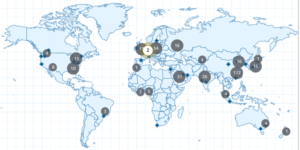[ad_1]
A core precedence for the Cognitive Companies group is to make sure its AI expertise, together with facial recognition, is developed and used responsibly. Whereas now we have adopted six important ideas to information our work in AI extra broadly, we acknowledged early on that the distinctive dangers and alternatives posed by facial recognition expertise necessitate its personal set of guiding ideas.
To strengthen our dedication to those ideas and arrange a stronger basis for the longer term, Microsoft is saying significant updates to its Accountable AI Commonplace, the interior playbook that guides our AI product improvement and deployment. As a part of aligning our merchandise to this new Commonplace, now we have up to date our strategy to facial recognition together with including a brand new Restricted Entry coverage, eradicating AI classifiers of delicate attributes, and bolstering our investments in equity and transparency.
Safeguards for accountable use
We proceed to offer constant and clear steerage on the accountable deployment of facial recognition expertise and advocate for legal guidelines to manage it, however there’s nonetheless extra we should do.
Efficient at this time, new clients want to use for entry to make use of facial recognition operations in Azure Face API, Laptop Imaginative and prescient, and Video Indexer. Present clients have one yr to use and obtain approval for continued entry to the facial recognition providers based mostly on their supplied use instances. By introducing Restricted Entry, we add an extra layer of scrutiny to the use and deployment of facial recognition to make sure use of those providers aligns with Microsoft’s Accountable AI Commonplace and contributes to high-value end-user and societal profit. This consists of introducing use case and buyer eligibility necessities to achieve entry to those providers. Examine instance use instances, and use instances to keep away from, right here. Beginning June 30, 2023, present clients will now not be capable to entry facial recognition capabilities if their facial recognition utility has not been authorised. Submit an utility kind for facial and movie star recognition operations in Face API, Laptop Imaginative and prescient, and Azure Video Indexer right here, and our group can be in contact by way of electronic mail.
Facial detection capabilities (together with detecting blur, publicity, glasses, head pose, landmarks, noise, occlusion, and facial bounding field) will stay usually out there and don’t require an utility.
In one other change, we’ll retire facial evaluation capabilities that purport to deduce emotional states and identification attributes resembling gender, age, smile, facial hair, hair, and make-up. We collaborated with inside and exterior researchers to grasp the restrictions and potential advantages of this expertise and navigate the tradeoffs. Within the case of emotion classification particularly, these efforts raised vital questions on privateness, the dearth of consensus on a definition of “feelings,” and the lack to generalize the linkage between facial features and emotional state throughout use instances, areas, and demographics. API entry to capabilities that predict delicate attributes additionally opens up a variety of the way they are often misused—together with subjecting folks to stereotyping, discrimination, or unfair denial of providers.
To mitigate these dangers, now we have opted to not help a general-purpose system within the Face API that purports to deduce emotional states, gender, age, smile, facial hair, hair, and make-up. Detection of those attributes will now not be out there to new clients starting June 21, 2022, and present clients have till June 30, 2023, to discontinue use of those attributes earlier than they’re retired.
Whereas API entry to those attributes will now not be out there to clients for general-purpose use, Microsoft acknowledges these capabilities might be helpful when used for a set of managed accessibility situations. Microsoft stays dedicated to supporting expertise for folks with disabilities and can proceed to make use of these capabilities in help of this aim by integrating them into functions resembling Seeing AI.
Accountable improvement: bettering efficiency for inclusive AI
According to Microsoft’s AI precept of equity and the supporting targets and necessities outlined within the Accountable AI Commonplace, we’re bolstering our investments in equity and transparency. We’re endeavor accountable information collections to establish and mitigate disparities within the efficiency of the expertise throughout demographic teams and assessing methods to current this info in a method that may be insightful and actionable for our clients.
Given the potential socio-technical dangers posed by facial recognition expertise, we’re wanting each inside and past Microsoft to incorporate the experience of statisticians, AI/ML equity consultants, and human-computer interplay consultants on this effort. We’ve got additionally consulted with anthropologists to assist us deepen our understanding of human facial morphology and make sure that our information assortment is reflective of the variety our clients encounter of their functions.
Whereas this work is underway, and along with the safeguards described above, we’re offering steerage and instruments to empower our clients to deploy this expertise responsibly. Microsoft is offering clients with new instruments and sources to assist consider how effectively the fashions are performing towards their very own information and to make use of the expertise to grasp limitations in their very own deployments. Azure Cognitive Companies clients can now make the most of the open-source Fairlearn bundle and Microsoft’s Equity Dashboard to measure the equity of Microsoft’s facial verification algorithms on their very own information—permitting them to establish and deal with potential equity points that would have an effect on totally different demographic teams earlier than they deploy their expertise. We encourage you to contact us with any questions on how one can conduct a equity analysis with your personal information.
We’ve got additionally up to date the transparency documentation with steerage to help our clients to enhance the accuracy and equity of their programs by incorporating significant human evaluation to detect and resolve instances of misidentification or different failures, by offering help to individuals who consider their outcomes had been incorrect, and by figuring out and addressing fluctuations in accuracy as a consequence of variation in operational circumstances.
In working with clients utilizing our Face service, we additionally realized some errors that had been initially attributed to equity points had been brought on by poor picture high quality. If the picture somebody submits is simply too darkish or blurry, the mannequin might not be capable to match it appropriately. We acknowledge that this poor picture high quality might be unfairly concentrated amongst demographic teams.
That’s the reason Microsoft is providing clients a brand new Recognition High quality API that flags issues with lighting, blur, occlusions, or head angle in photographs submitted for facial verification. Microsoft additionally gives a reference app that gives real-time ideas to assist customers seize higher-quality photographs which can be extra prone to yield correct outcomes.

To leverage the picture high quality attribute, customers must name the Face Detect API. See the Face QuickStart to check out the API.
Trying to the longer term
We’re enthusiastic about the way forward for Azure AI and what responsibly developed applied sciences can do for the world. We thank our clients and companions for adopting accountable AI practices and being on the journey with us as we adapt our strategy to new accountable AI requirements and practices. As we launch the brand new Restricted Entry coverage for our facial recognition service, along with new pc imaginative and prescient options, your suggestions will additional advance our understanding, practices, and expertise for accountable AI.
Study extra on the Restricted Entry FAQ.
[ad_2]
Source link





